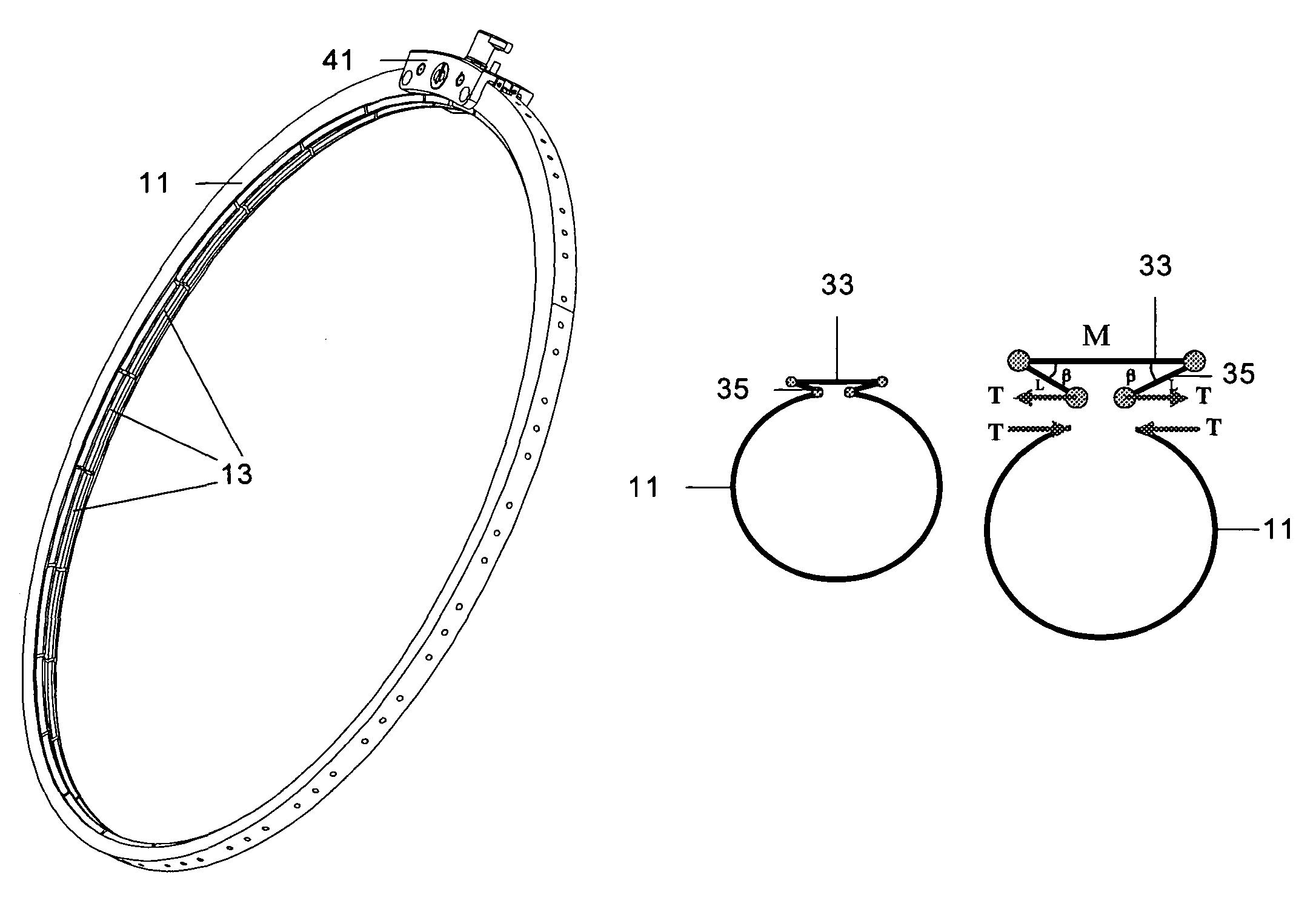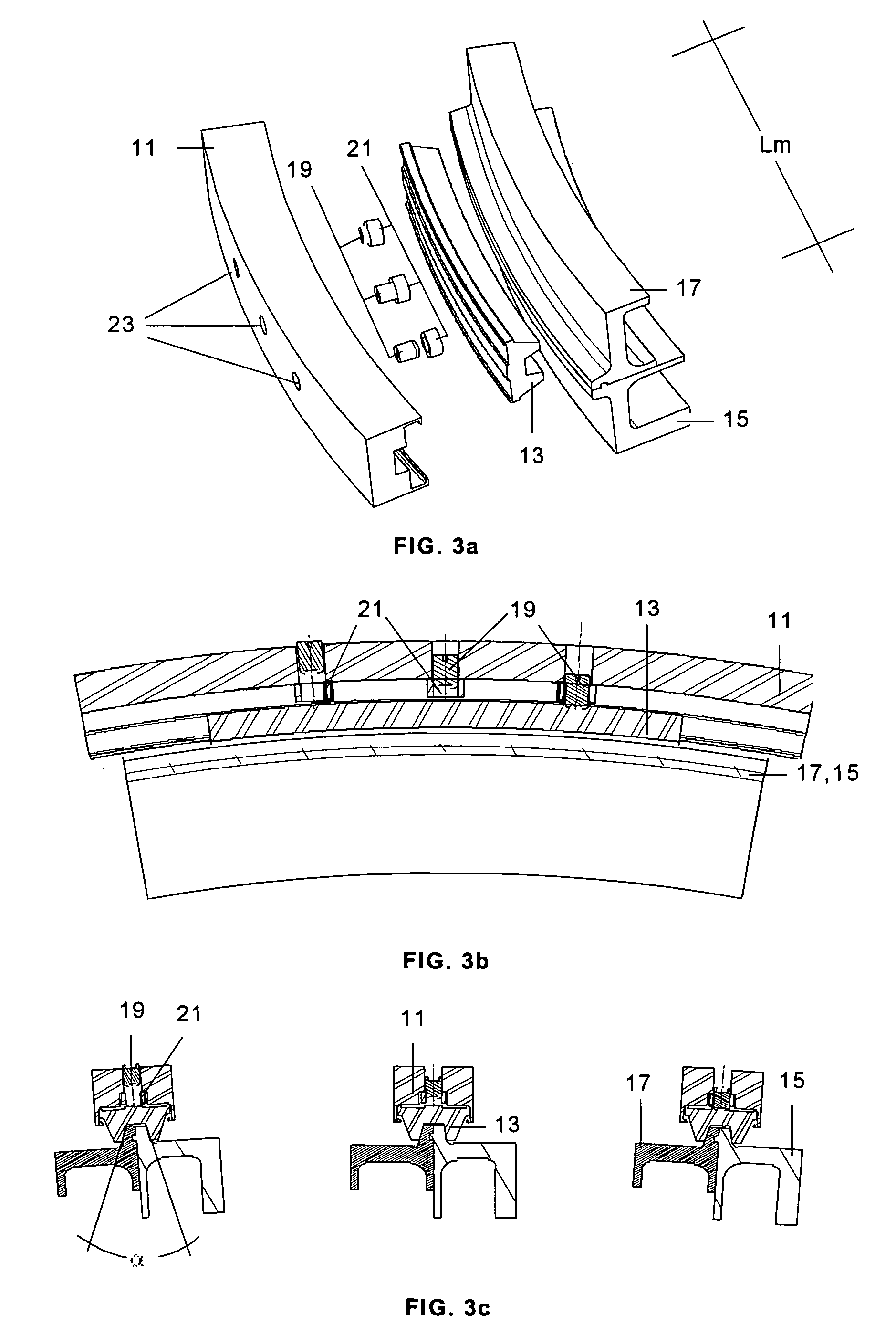Launching vehicle and satellite connection-separation apparatus
a satellite connection and satellite technology, applied in the direction of cosmonautic components, weapons, cosmonautic parts, etc., can solve the problems of reducing reliability, generating high vibratory disturbance or shock along the whole vehicle, and not being the most suitable for joining large structures with cylindrical interfaces, etc., to achieve the effect of improving performance and large mass
- Summary
- Abstract
- Description
- Claims
- Application Information
AI Technical Summary
Benefits of technology
Problems solved by technology
Method used
Image
Examples
first embodiment
[0086]FIGS. 6 and 7 show the opening-closing device 41 with the controlled opening mechanism in three positions. The opening device 41 comprises a conventional mechanism 46 for opening-closing of the band 11 including a retaining element such as, for example, a bolt 47 which joins the ends of the band and which may be released at the time of separating the satellite from its launcher by means of for example a pyrotechnic cutter 48, and the controlled opening mechanism is formed by a support 43 connected in an articulated manner to the two ends 7, 9 of the band by means of the connecting rods 45.
[0087]In the first of the positions mentioned, from top to bottom, the starting position is represented, before the command for separating the satellite from the launcher vehicle, with the ends 7, 9 of the band very close together. The second is an intermediate position in which the band 11 has not yet separated from the interface rings 15, 17, but in which its tension has relaxed given that ...
second embodiment
[0089]Following FIGS. 8a and 8b the controlled opening mechanism will now be described.
[0090]The opening-closing device 61 includes in this case a support 63 including two grooves 65 defining the movement that two shafts 67 associated to the ends of the band 11 must follow. The shape and size of the grooves 65 are designed such that they have two sections 68, 69 of different slope and with a transition between them. The first section 68 is defined with a very steep slope in order to slow down the separation movement of the ends of the band 11. The angle formed by this section with a vertical line is a design parameter equivalent to the initial angle of the connecting rod in the first embodiment of the invention. The smaller this angle is the slower the initial separation will be. Kinematic compatibility forces the main support to shift vertically, i.e. outwards, in order to allow the separation of both shafts. For this it is necessary to invest the corresponding kinetic energy, whic...
third embodiment
[0095]the controlled opening mechanism is now described following FIGS. 9a and 9b.
[0096]The opening-closing device 71 includes in this case a support 73 including two grooves 75 which define the movement that two shafts 77 associated to the ends 7, 9 of the band 11 must follow. A nub 80 is disposed between the shafts 77.
[0097]The support 73 has certain elasticity which allows managing the times of two sections similar to those of the previous embodiment. For its part, the opening-closing device 71 contains similar locking and unlocking elements.
[0098]In this case, the support 73 is the only metal part which, due to its elasticity and the presence of a separator 76 in each groove 75, allows two positions 78, 79 of its lower portion. In one of these, that corresponding to its natural position 79 (open position), it leaves a sufficient allowance for the shafts 77 to pass through it. In the other, that corresponding to its deformed position 78 (closed position), this allowance is cance...
PUM
 Login to View More
Login to View More Abstract
Description
Claims
Application Information
 Login to View More
Login to View More - R&D
- Intellectual Property
- Life Sciences
- Materials
- Tech Scout
- Unparalleled Data Quality
- Higher Quality Content
- 60% Fewer Hallucinations
Browse by: Latest US Patents, China's latest patents, Technical Efficacy Thesaurus, Application Domain, Technology Topic, Popular Technical Reports.
© 2025 PatSnap. All rights reserved.Legal|Privacy policy|Modern Slavery Act Transparency Statement|Sitemap|About US| Contact US: help@patsnap.com



